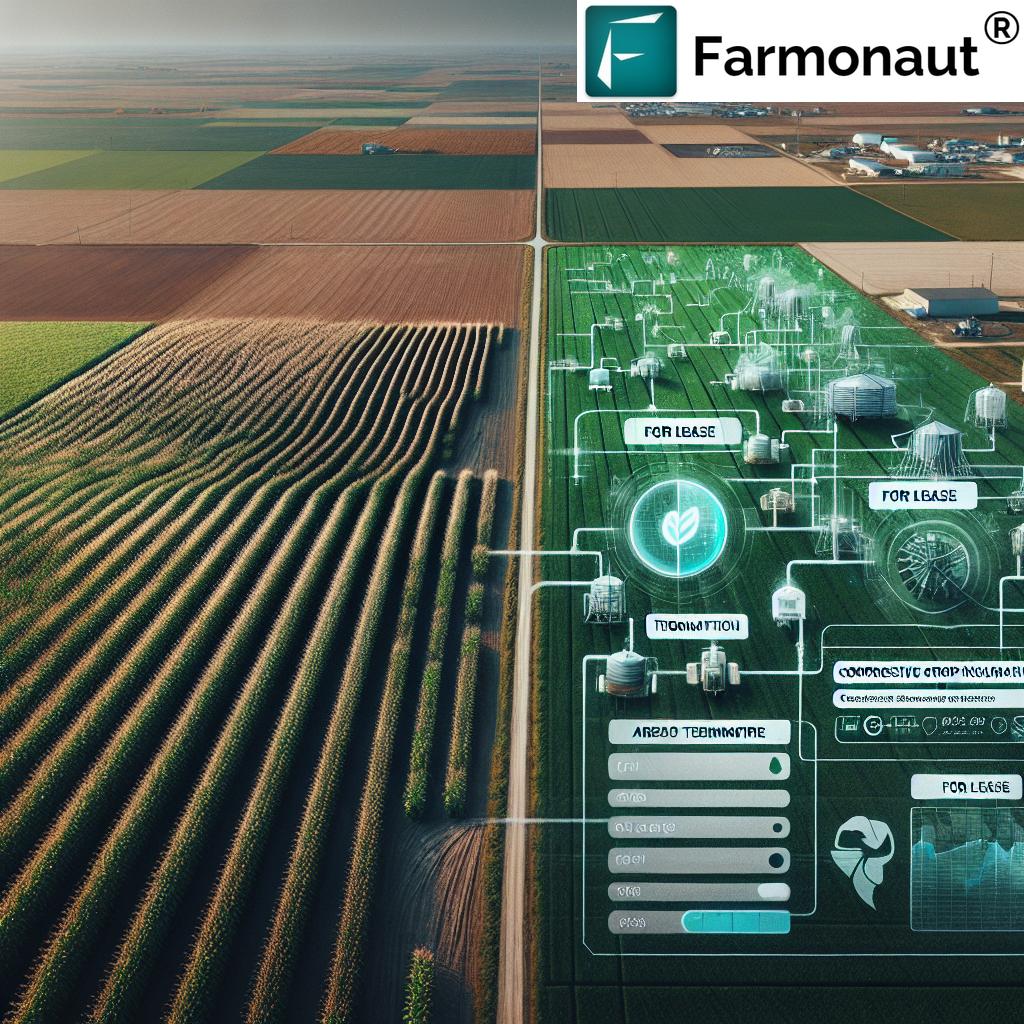Here’s a comprehensive blog post based on your requirements:
Alabama’s Agricultural Revolution: How Precision Farming is Boosting Rural Economic Growth and Crop Yields
“Alabama’s agricultural sector has seen over $3.5 billion invested in recent projects, boosting rural economic growth.”
We are witnessing a remarkable transformation in Alabama’s agricultural landscape. The state’s rich farming heritage is blending seamlessly with cutting-edge technology, ushering in an era of unprecedented growth and innovation. In this blog post, we’ll explore how precision farming is revolutionizing Alabama’s rural economy and propelling crop yields to new heights.
The Dawn of a New Agricultural Era
Alabama’s agricultural sector is experiencing a renaissance, driven by strategic investments and a commitment to innovation. With over $3.5 billion poured into recent projects, the state is positioning itself as a leader in agricultural technology and sustainable farming practices. This surge in agricultural investment is not just transforming the way we farm; it’s reshaping the entire rural economic landscape of Alabama.
At the heart of this revolution is precision agriculture, a farming management concept that uses information technology to ensure crops and soil receive exactly what they need for optimum health and productivity. This approach is particularly beneficial for key crops like peanuts, which play a crucial role in Alabama’s agricultural economy.

The Role of Peanut Farming Technology
Peanut farming, a cornerstone of Alabama’s agricultural industry, is undergoing a significant technological upgrade. The state’s commitment to peanut farming technology is evident in the research and development efforts aimed at improving crop resilience and yield. Advanced genomics research is paving the way for drought-resistant and disease-tolerant peanut varieties, addressing some of the most pressing challenges faced by farmers.
These advancements in peanut farming technology are not just academic pursuits; they have real-world implications for farmers across the state. By adopting precision agriculture solutions, peanut farmers can now:
- Optimize irrigation schedules based on real-time soil moisture data
- Apply fertilizers and pesticides with pinpoint accuracy, reducing waste and environmental impact
- Monitor crop health remotely, allowing for early detection of disease or pest issues
- Make data-driven decisions that boost yields and reduce operational costs
Sustainable Agriculture Research: A Pillar of Growth
Alabama’s commitment to sustainable agriculture research is another critical factor driving the state’s agricultural revolution. Institutions like Auburn University and the HudsonAlpha Institute for Biotechnology are at the forefront of this research, developing innovative solutions that balance productivity with environmental stewardship.
Key areas of sustainable agriculture research in Alabama include:
- Water conservation techniques for drought-prone regions
- Soil health management to improve long-term fertility
- Development of biopesticides and natural pest control methods
- Integration of cover crops to enhance soil quality and reduce erosion
This focus on sustainable practices not only benefits the environment but also contributes to the long-term viability of Alabama’s agricultural sector. By adopting these research-driven approaches, farmers can ensure their land remains productive for generations to come.
Agtech Innovation: Driving the Future of Farming
Alabama’s agricultural revolution is powered by a strong focus on agtech innovation. The state’s strategic plan emphasizes the development and adoption of cutting-edge agricultural technologies, positioning Alabama as a hub for agtech startups and established companies alike.
One of the most exciting developments in this space is the HudsonAlpha AgTech Accelerator. This initiative is designed to nurture innovative startups working on agricultural technology solutions. By investing $100,000 in each of five selected projects, the accelerator is helping to bring groundbreaking ideas to market, benefiting local farmers and the broader agricultural industry.
Some of the key areas of agtech innovation in Alabama include:
- AI-powered crop management systems
- Drone technology for field mapping and crop monitoring
- Blockchain solutions for supply chain transparency
- IoT sensors for real-time environmental monitoring
- Robotic systems for automated harvesting and processing
These innovations are not just theoretical; they’re being implemented across Alabama’s farms, driving efficiency and productivity to new levels. As a result, the state is seeing increased crop yields, reduced resource usage, and improved profitability for farmers.
Rural Economic Development: The Ripple Effect
The impact of Alabama’s agricultural revolution extends far beyond the farm gate. The surge in agricultural investment is having a profound effect on rural economic development, creating new opportunities and revitalizing communities across the state.
Some of the key ways in which precision farming is boosting rural economic growth include:
- Job creation in high-tech agricultural roles
- Increased demand for skilled workers in agtech and related industries
- Growth of supporting businesses, such as agricultural equipment suppliers and data analytics firms
- Improved infrastructure to support advanced farming operations
- Increased tax revenue for rural communities, supporting local services and development
This economic growth is not limited to a single region. From the Wiregrass area in the southeast to the Tennessee Valley in the north, communities across Alabama are benefiting from the state’s agricultural revolution.

Precision Agriculture Solutions: The Role of Technology
At the core of Alabama’s agricultural revolution are precision agriculture solutions that leverage advanced technology to optimize farming practices. These solutions are helping farmers make more informed decisions, leading to improved crop yields and resource efficiency.
One company at the forefront of this technological revolution is Farmonaut. Their advanced remote sensing technology aligns perfectly with Alabama’s push for crop yield optimization and agricultural technology acceleration. By providing farmers with real-time satellite imagery and AI-powered insights, Farmonaut is enabling precision farming on a scale previously unimaginable.
Key features of precision agriculture solutions like Farmonaut include:
- Satellite-based crop health monitoring
- AI-driven advisory systems for crop management
- Blockchain-based traceability for supply chain transparency
- Resource management tools for optimizing water and fertilizer use
These technologies are not just improving efficiency; they’re also making farming more sustainable by reducing waste and minimizing environmental impact. As Alabama continues to embrace these precision agriculture solutions, we can expect to see even greater gains in productivity and sustainability.
Explore Farmonaut’s precision agriculture solutions:
Crop Yield Optimization: The Science of Growth
One of the most significant outcomes of Alabama’s agricultural revolution is the dramatic improvement in crop yield optimization. By leveraging data-driven insights and advanced farming techniques, farmers across the state are seeing unprecedented increases in their harvest volumes.
Key factors contributing to crop yield optimization include:
- Precise application of fertilizers and pesticides based on real-time soil and crop data
- Optimal planting and harvesting schedules informed by weather forecasts and historical data
- Early detection and treatment of crop diseases through remote sensing technology
- Improved seed selection based on local soil and climate conditions
- Efficient water management through smart irrigation systems
These optimization strategies are particularly impactful for Alabama’s key crops, such as peanuts, cotton, and soybeans. For example, peanut farmers using precision agriculture techniques have reported yield increases of up to 20% compared to traditional farming methods.
“The Wiregrass region in Alabama is experiencing significant agricultural development, contributing to the state’s $70+ billion economic impact.”
Agricultural Genomics Research: Breeding Success
Alabama’s commitment to agricultural innovation is perhaps most evident in its investment in agricultural genomics research. This cutting-edge field is revolutionizing crop development, creating varieties that are more resilient, productive, and sustainable.
The HudsonAlpha Institute for Biotechnology is leading the charge in this area, with groundbreaking research focused on:
- Developing drought-resistant crop varieties
- Enhancing the nutritional content of staple crops
- Breeding plants with natural pest resistance
- Improving crop yield potential through genetic optimization
This research is not just academic; it’s having a real-world impact on Alabama’s farms. For instance, new peanut varieties developed through genomics research are helping farmers in the Wiregrass region increase their yields while reducing water usage and pesticide applications.
Food Processing Industry Growth: From Farm to Table
Alabama’s agricultural revolution is not limited to the fields; it’s also driving significant growth in the food processing industry. This expansion is creating new markets for local farmers and bringing value-added products to consumers both domestically and internationally.
Recent developments in Alabama’s food processing sector include:
- The opening of a $1.1 billion J.M. Smucker Co. manufacturing facility in McCalla
- Expansion of poultry processing plants across the state
- Investment in advanced food packaging technologies
- Development of specialty food production facilities for niche markets
This growth in food processing is not only creating jobs but also strengthening the link between Alabama’s farms and global markets. It’s a testament to the state’s commitment to building a comprehensive and resilient agricultural ecosystem.
The Role of Agricultural Technology Accelerators
Agricultural technology accelerators are playing a crucial role in fostering innovation and driving Alabama’s agricultural revolution forward. These programs provide funding, mentorship, and resources to agtech startups, helping to bring new ideas from concept to market.
The benefits of agricultural technology accelerators include:
- Rapid prototyping and testing of new agricultural technologies
- Connecting innovators with farmers for real-world feedback
- Attracting investment to the state’s agtech sector
- Creating a culture of innovation in agriculture
- Bridging the gap between academic research and commercial applications
As these accelerators continue to nurture new ideas and technologies, we can expect to see a steady stream of innovations that will further enhance Alabama’s agricultural productivity and sustainability.
Expanding Markets: Global Reach, Local Impact
Alabama’s agricultural revolution is not just about increasing production; it’s also about expanding markets for the state’s agricultural products. Through strategic investments and innovative marketing approaches, Alabama is reaching new consumers both domestically and internationally.
Key initiatives for expanding markets include:
- Development of value-added products to increase export potential
- Participation in international trade shows and missions
- Leveraging e-commerce platforms to reach direct consumers
- Collaboration with chefs and food influencers to promote Alabama-grown products
- Investing in cold chain logistics to expand reach for perishable goods
These efforts are opening up new opportunities for Alabama’s farmers and food producers, ensuring that the benefits of the state’s agricultural revolution are felt far beyond its borders.
Fostering a Sustainable Agricultural Environment
Sustainability is at the heart of Alabama’s agricultural revolution. The state is committed to fostering an agricultural environment that is not only productive but also environmentally responsible and socially equitable.
Key aspects of Alabama’s sustainable agriculture approach include:
- Promotion of conservation tillage and other soil health practices
- Implementation of precision irrigation systems to reduce water usage
- Encouragement of biodiversity through habitat conservation
- Support for organic and regenerative farming practices
- Development of renewable energy solutions for farm operations
By prioritizing sustainability, Alabama is ensuring that its agricultural revolution will have lasting benefits for generations to come.
The Future of Alabama’s Agriculture: A Vision of Growth
As we look to the future, the outlook for Alabama’s agricultural sector is exceptionally bright. The state’s strategic investments in technology, research, and infrastructure are laying the groundwork for continued growth and innovation.
Key trends shaping the future of Alabama’s agriculture include:
- Increased adoption of AI and machine learning in farm management
- Development of vertical farming and urban agriculture initiatives
- Expansion of agritourism opportunities
- Integration of renewable energy sources in agricultural operations
- Continued focus on developing climate-resilient crop varieties
With these initiatives in place, Alabama is well-positioned to remain at the forefront of agricultural innovation, driving rural economic growth and ensuring food security for years to come.
Alabama’s Agricultural Investment and Impact
| Agricultural Sector | Investment Amount (millions) | Estimated Job Creation | Projected Crop Yield Increase (%) | Economic Impact (millions) |
|---|---|---|---|---|
| Peanut Farming | $500 | 1,000 | 20% | $750 |
| Food Processing | $1,100 | 750 | N/A | $1,500 |
| Precision Farming Technology | $300 | 500 | 15% | $450 |
| Agtech Innovation Programs | $100 | 250 | 10% | $200 |
| Sustainable Agriculture Research | $200 | 300 | 12% | $300 |
| Remote Sensing Technology (Farmonaut) | $50 | 100 | 18% | $100 |
Conclusion: A Bright Future for Alabama’s Agriculture
Alabama’s agricultural revolution, driven by precision farming and strategic investments, is transforming the state’s rural landscape and boosting economic growth. From cutting-edge peanut farming technology to sustainable agriculture research, the state is embracing innovation at every level of the agricultural value chain.
The synergy between traditional farming practices and modern agtech is creating new opportunities for farmers, researchers, and entrepreneurs alike. As Alabama continues to invest in its agricultural sector, we can expect to see even greater advances in crop yields, sustainability, and rural prosperity.
For those looking to be part of this exciting transformation, Farmonaut offers advanced remote sensing technology that aligns perfectly with Alabama’s push for crop yield optimization and agricultural technology acceleration. By leveraging satellite data and AI-powered insights, farmers can take their operations to the next level, contributing to the ongoing success of Alabama’s agricultural revolution.
Explore Farmonaut’s API for custom agricultural solutions:
Farmonaut Satellite API
API Developer Docs
FAQs
- What is precision farming, and how is it benefiting Alabama’s agriculture?
Precision farming uses technology to optimize crop management, resulting in increased yields and reduced resource use. In Alabama, it’s helping farmers make data-driven decisions, leading to improved productivity and sustainability. - How is Alabama supporting agtech innovation?
Alabama is supporting agtech innovation through initiatives like the HudsonAlpha AgTech Accelerator, which provides funding and resources to promising agricultural technology startups. - What role does peanut farming play in Alabama’s agricultural economy?
Peanut farming is a crucial part of Alabama’s agricultural sector, contributing over $210 million annually and supporting approximately 3,000 jobs across 37 counties. - How is sustainable agriculture research contributing to Alabama’s agricultural growth?
Sustainable agriculture research in Alabama is focusing on developing drought-resistant crops, improving soil health, and reducing environmental impact, all of which contribute to long-term agricultural growth and sustainability. - What impact is the agricultural revolution having on rural economic development in Alabama?
The agricultural revolution is creating new job opportunities, attracting investments, and stimulating growth in related industries, all of which are contributing to rural economic development across Alabama.













